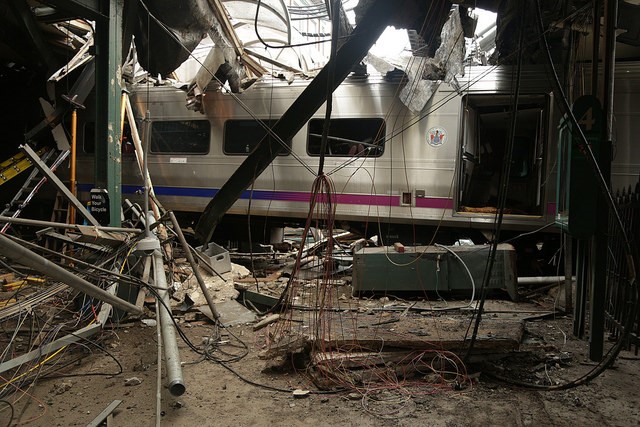
[slideshow_deploy id=’899′]
BY SHANNON MCLAUGHLIN
OF PASCACK PRESS
Amtrak President and CEO Richard Anderson threatened to suspend operations at railroads that fail to implement positive train control (PTC) safety technology by the end of the year – which could impact NJ Transit riders.
A number of recent rail accidents across the country has increased the push for PTC. In September 2016, a Pascack Valley Line train crashed into the Hoboken Terminal, killing one woman. Last December, an Amtrack train derailed in Washington, resulting in three deaths.
Anderson spoke at a House transportation subcommittee hearing on Feb. 15 to discuss the status of PTC implementation. He questioned whether Amtrak will continue to operate on railroads that apply for PTC implementation extensions, and said that Amtrak will suspend operations at host railroads that appear unlikely to achieve sufficient progress in implementing the safety technology.
“It’s now clear that Amtrak, [the Federal Railroad Administration], Congress and the various railroads are likely to confront scenarios where PTC is not yet operational by the end of the year,” Anderson said.
PTC is a crash-prevention technology that automatically stops trains in the event of human error. All U.S. railroads are required to implement the technology by the federal deadline of Dec. 31, with a possible extension to 2020.
If Anderson follows through with his warning, NJ Transit’s lag in PTC installation could affect commuters beginning next year.
Every U.S. railroad submits a quarterly filing to the Federal Railroad Administration on its progress with PTC implementation. According to NJ Transit’s fourth quarter filing, covering the period of Oct. 1 to Dec. 31, 2017, the railroad has fully equipped 35 out of its 440 locomotives with PTC technology.
A Federal Railroad Administration report from last fall placed NJ Transit in the bottom six among U.S. railroads based on their progress with installing the safety technology. While NJ Transit had 7 percent of positive train control hardware installed at the time, 12 U.S. railroads were at 100 percent installation, and another five were at 90 percent or above. According to NJ Transit’s fourth quarter filing, 143 of its 1,100 employees are trained on PTC, which is an increase of six more than at the end of the third quarter.
[slideshow_deploy id=’899′]
From the period of the third quarter to the fourth, NJ Transit had nine more radio towers fully installed and equipped, but has made no further progress on PTC implementation.
National Train Safety Board Chairman Robert Sumwalt, who also spoke at the subcommittee hearing, said the purpose of implementing PTC is preventing avoidable incidents.
“Since the enactment of the Rail Safety Improvement Act of 2008 [which requires PTC implementation], the National Train Safety Board has completed investigations of 22 accidents that could have been prevented by PTC,” he said. “Together, these accidents have resulted in 23 deaths, over 300 injuries and over $126 million in property damage.”
The NJ Transit commuter train crash in September 2016 was caused by the train engineer’s fatigue resulting from undiagnosed severe obstructive sleep apnea, the National Transportation Safety Board determined.
U.S. Rep. Albio Sires (NJ-7), who is on the House subcommittee, expressed concern to officials at the hearing that NJ Transit will not make its end-of-year deadline. He asked a representative from the Federal Railroad Administration for an update on NJ Transit’s progress.
“What I really want to know is what progress have they made. I think I know … you can say ‘none,’” Sires said.
A Federal Railroad Administration official told Sires that they are not giving up on NJ Transit just yet.
